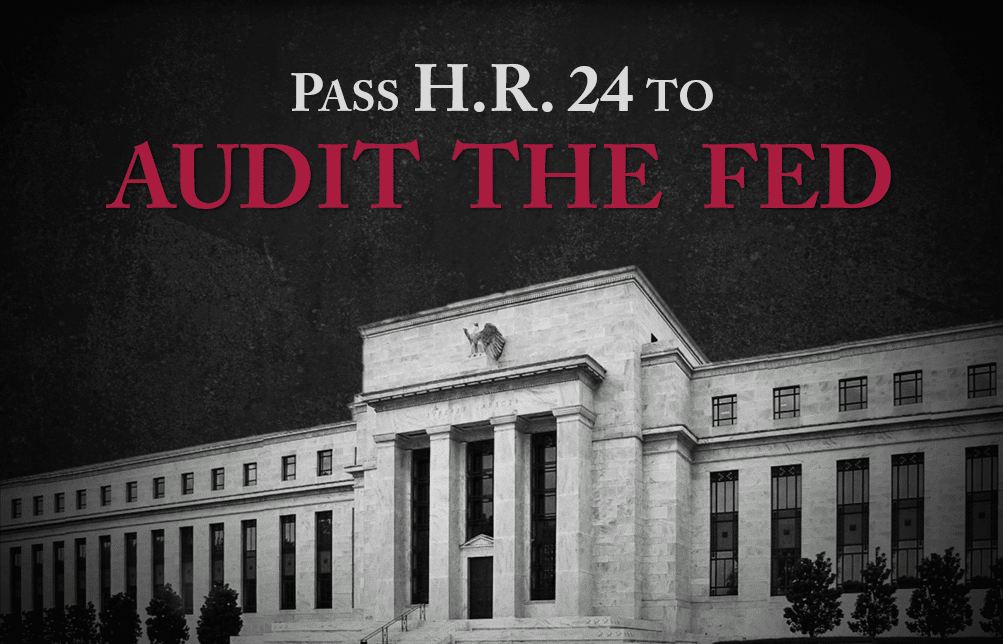Alert Summary
Members of Congress are seeking to enact H.R. 24, which would mandate a full audit of the unconstitutional and unaccountable Federal Reserve.
Take Action NowContact your Representative
Please help enact H.R. 24 by contacting your U.S. representative and senators. Inform them of the dangers of the Federal Reserve, and urge them to support legislation that ensures transparency, enforces the Constitution, and restores sound monetary policy nationwide.
Clicking this button will take you to a page where you can send a pre-written letter, call your officials, and/or send video messages.

Members of Congress are seeking to enact legislation to conduct a full audit of the unconstitutional and unaccountable Federal Reserve.
H.R. 24, titled the “Federal Reserve Transparency Act of 2023” is sponsored by U.S. Representative Thomas Massie (R-Ky.) and is currently cosponsored by 69 other representatives.
If enacted, H.R. 24 would require the U.S. Comptroller General to conduct a full audit of the entire Federal Reserve System.
In an interview with The New American, Congressmen Massie discussed the importance of H.R. 24, stating:
The Federal Reserve’s never undergone a full audit. Now you’ve got two groups of people who oppose my bill: those who say that it’s already audited, and so they don’t need an audit, and those who say if you audit it, then it will change the way that it behaves, that it needs to operate in secret and the markets can’t influence it and Congress can’t influence it, can’t be open to political pressure that an audit would expose.
Well, both of those arguments can’t be true… There’s a perfunctory audit that doesn’t really uncover the way they make decisions, and we need to know that. All the authority that’s vested in the Federal Reserve came from Congress … you can delegate authority, but you can’t delegate responsibility, and we’re still responsible for that, so we need to know what they’re doing.
Now there’s this other argument that they’re independent. Give me a break. They may be independent of Congress, but they’re not independent of the bankers in Wall Street. All of the heads of the Federal Reserve and the heads of … the regional Banks, they come from industry and they’re going to go back to industry. … [A]nd the [Treasury Department] and the Federal Reserve communicate every day… Don’t tell me the Federal Reserve is independent of the executive branch. They’re printing money and buying the debt off each other. … This is a gift to the executive branch. Basically, we’ve given up our power to the executive branch and to industry, to the bankers. We need to reassert [our power]. An audit would do that, and once you do the audit you may find that you need to end [the Fed].
H.R. 24 will effectively bring to light the Fed’s activities that very few people are aware of due to the unconstitutional entity’s secrecy.
Although the Federal Reserve must be totally abolished, the very least Congress should do is conduct an audit. A partial audit was conducted in 2010, finding that the Fed gave over $16 trillion in secret bank bailouts during the Great Recession.
The Federal Reserve’s creation in 1913 remains one of the most egregious violations of the U.S. Constitution. In addition to blatantly violating the Constitution by its very existence, the Fed has the ability to single-handedly manipulate the economy and devalue the U.S. dollar.
A sound monetary policy is necessary for a nation’s economy to be stable and enable material prosperity. Already, the Federal Reserve and the Deep State have caused far too much damage through their inflation of the U.S. dollar and issuance of fiat currency. It is imperative that Congress follow the Constitution and put an end to this.
H.R. 24 is a great first step in that direction. Contact your U.S. representative and senators and urge them to support this bill.
Although we provide a way to easily email legislators, we know from long experience that it takes a lot more interaction with your legislators to get your point across than that provided by emails alone.
That's why we provide an easy way not only to email them, but to contact them by phone, tweet, and even video message them.
